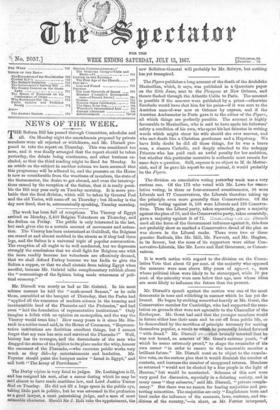The Figaro publishes a long account of the death of
the Archduke Maximilian, which, it says, was published in a Queretaro paper on the 20th June, sent to the Picayune at New Orleans, and thence flashed through the Atlantic Cable to Paris. The account is possible if the account were published by a priest—otherwise Escobedo would have shot him for his pains—if it was sent to the Austrian man-of-war now at Orleans by express, and if the Austrian Ambassador in Paris gave it to the editor of the Figaro, all which things are perfectly possible. The account is highly favourable to Maximilian, who is said to have made his followers' safety a condition of his own, who spent his last minutes in writing words which might cheer his wife should she ever recover, and who met death like a Christian gentleman and a Hapsburg. We have little doubt he did all those things, for he was a brave man, a sincere Catholic, and deeply attached to the unhappy Princess who has paid such an awful penalty for her ambition, but whether this particular narrative is authentic must remain for some days a question. Still, expense is no object to M. de Metter- nich, and if he gave his report to any journal, it would probably be the Figaro.






























